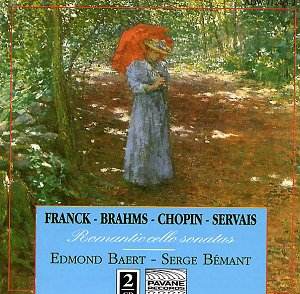The general heading of 'Romantic Cello Sonatas' actually
only refers to the contents of the first disc of this well-planned product.
Disc One contains the 'meat' (two sonatas originally for violin and
piano, here played on the cello); Disc Two introduces lighter, more
flamboyantly virtuoso fare.
The relatively close recording for the Franck, in general,
works well for this impassioned piece. Try the opening of the second
movement for a demonstration of the pianist's prowess as well as that
of the cellist. Whether one warms to a performance of this piece on
the cello depends very much on taste. Certainly the lyrical lines emerge
well, and there is no question of any drowning out by Bémant.
If anything, recording perspective becomes closer in the third movement
(Andante), but there is no denying that the pair have the measure of
the finale: the tempo is perfectly caught and there is real excitement.
Many of the qualities of the Franck characterise the
Brahms as well. Intonation is excellent from Baert (even in higher registers
and in stopped passages), and his accompanist is most attentive. The
opening movement is autumnal and wistful (if not really the prescribed,
'Vivace ma non troppo'). Bémant has complete mastery of the piano
part (no small matter). Perhaps the Adagio could be further ennobled
(more space and depth from the recording would probably have helped
here). Again, the players elect to highlight the wistful nature of the
finale, although there is plenty of agility when required.
Although not many people may want to play the second
disc through in one sitting, it contains much to recommend it, not least
the 'Introduction and Polonaise', Op. 3 by Chopin. The Polonaise is
impassioned and is, indeed, pure Chopin, and Baert also makes much of
the Introduction's lyric impulse. The Chopin/Franchomme is in many ways
the typical Romantic 'fantaisie,' even complete with melodramatic tremolandi
for the piano.
Adrien-François Servais obtained a Premier Prix
at the Brussels Conservatoire, often performing his own works (Berlioz
referred to him as 'Paganinian'). He composed two Cello Concertos and
16 Fantaisies for cello. The 'Souvenir de Spa' is certainly a fine example
of its genre. Baert plays it brilliantly, treating the listener to a
feast of double-stopping towards the close. Similarly, breathtaking
octaves occur in the 'Fantaisie polonaise,' Op. 19.
Certainly this is a twofer which will provide much
entertainment.
Colin Clarke
